■ The emergency and critical intelligent
high-end comprehensive simulator consists of an adult simulated patient,
a computer, a simulated monitor, a simulated defibrillator, and an
operating trolley; Wireless connection can be achieved between simulated
patients and computers; Simulate artificial polymer materials,
environmentally friendly and pollution-free; The anatomical landmarks
are obvious and can touch the nipples, ribs, sternum, and xiphoid
process, making it easy to operate and locate.
■ Simulate the
accurate anatomical position of the head and neck of a human, with the
head able to swing left and right and rotate horizontally 180 degrees
for easy removal of oral foreign objects.
■ The eyeball is simulated
using OLED, with visible colored retina, black pupils, transparent
crystals, and the ability to reflect light at any angle; The pupil has a
reflex to light, which automatically changes with the condition. In a
dead state, the pupil dilates and the reflex to light disappears;
Adjustable normal and slow reaction speed when reflecting light.
■
It can simulate the pulsation of the carotid artery, radial artery, and
brachial artery, and the examination of the carotid artery can
automatically generate operational records.
■ Can achieve autonomous breathing, with chest undulations during breathing, and adjustable breathing frequency.
■ Can simulate cyanosis on the lips and fingernail beds, with four adjustable levels of condition.

■
Airway management: realistic mouth, nose, tongue, gums, pharynx,
esophagus, and epiglottis, simulating the removal of foreign objects in
the respiratory tract, supporting three methods of opening the airway:
head up and neck lifting, head up and chin lifting, and two handed jaw
lifting. Equipped with an open airway sensor, the open airway can
automatically provide feedback (the system has operation records).
■
Able to perform tracheal intubation, oropharyngeal ventilation,
nasopharyngeal ventilation intubation, and laryngeal mask ventilation;
Able to perform fiberoptic bronchoscopy intubation; Retrograde
intubation; Visual laryngoscope tracheal intubation.
■ Can perform nasogastric tube intubation.
■ Can undergo training for puncture of the cricoid membrane.
■
Can provide training on pneumothorax decompression, pleural cavity
puncture, placement of chest drainage tubes, and tibial bone marrow
puncture.
■ Simulate 5 heart sound auscultation areas, 6 lung sound
auscultation areas, and 2 abdominal auscultation areas in front of the
patient's body.
■ Implementation standards for cardiopulmonary
resuscitation training: 2020 American Heart Association Guidelines for
Cardiopulmonary Resuscitation and Cardiovascular Emergency.
﹡Pressing automatically generates pulse, blood pressure waveform, and electrocardiogram.
﹡Actual pressing depth; It can provide real-time feedback on the
quality of cardiopulmonary resuscitation, including compression depth,
compression frequency, compression position information, whether
compression rebound is complete, ventilation tidal volume, ventilation
frequency, etc. Various presentation methods such as graphics, operation
waveforms, and text interfaces.
■ 32 types of electrocardiogram, vital signs can automatically change with changes in electrocardiogram and treatment.

■
Can practice multiple basic nursing operations: oral care, removal of
respiratory foreign bodies, sputum suction, oxygen inhalation, nasal
feeding, intravenous injection, intramuscular injection, subcutaneous
injection, bathing, changing clothes, catheterization, enema, turning
over, cold and hot therapy care, external genital scrubbing, external
genital wet and hot compress, fistula opening care, nebulized inhalation
therapy, and other nursing operations.
■ Blood pressure
measurement:Non invasive blood pressure measurement can be performed
using cuff type blood pressure monitors and monitors. The cuff type
blood pressure monitor requires manual measurement of blood pressure
through auscultation of Korotkov sounds, with adjustable volume and
blood pressure readings consistent with the current condition.
■ The
right hand can be used for intravenous injection and blood collection.
The puncture is correct and there is a clear sense of emptiness, and
there is a phenomenon of blood return.
■ Equipped with a simulated defibrillator
﹡Simulated defibrillators are specifically designed for training
emergency personnel before using real defibrillators. The simulator is a
highly simulated defibrillator with an appearance that is no different
from a real defibrillator, and the operating process is no different
from a real defibrillator, making it easy to train emergency personnel
for defibrillation training. Equipped with manual defibrillation and
automatic defibrillation (AED) functions.
■ Blood circulation simulator
﹡Blood flow velocity, circulation type, pulse frequency, and pulse intensity can all be adjusted.
﹡Equipped with LCD display screen, which can display pulse frequency, pulse intensity, etc.
■ Technical parameters of simulator operation software:
﹡Simulated human operation software can run, control, and monitor
various aspects of learning, and can be operated in both automatic and
manual modes.
﹡The system conducts consultation, physical
examination, auxiliary examination, operation, and medication treatment
according to the steps of clinical thinking. The system can preset
several consultation scenarios and multiple pathological signs, which
can be identified through physical examination.
﹡The system has two control modes: single mode and case mode.









